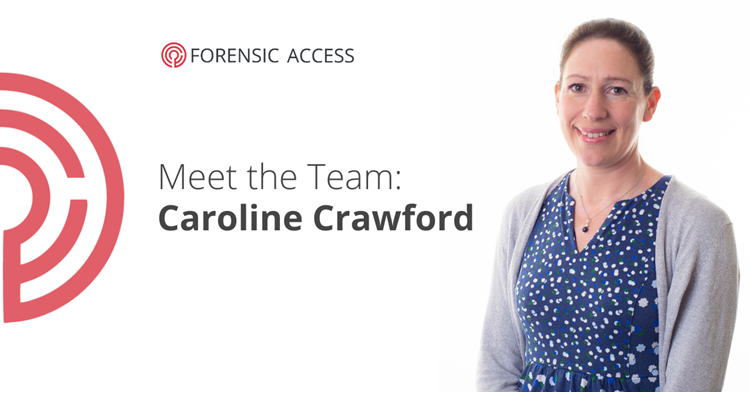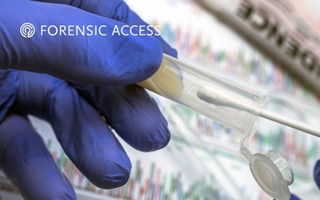Interviews August 22, 2022
Meet The Team – Caroline Crawford
Our experienced forensic biologists handle cases across a range of disciplines, including blood pattern analysis, body fluid analysis, DNA and crime scene examination. Senior Forensic Scientist in Biology, Caroline Crawford, has 20 years of experience in the field and we had the opportunity to talk to her about how she started in forensic biology and how she sees the future of DNA profiling.

Can you tell us about your role at Forensic Access?
“I’m a forensic biologist and I look at evidence that involves body fluids and DNA from a person. My role might involve examining items to recover DNA or recover blood to investigate a crime, it could be looking at how body fluids were deposited, for example, and blood patterns at crime scene or instruments and clothing to see what might have happened in a fight or assault.
“I’ll then be working out who those body fluids could have come from and trying to pull it all together, to work out what's happened in a case.
“During my time here, I have given evidence at Crown Court for both the prosecution and defence and some of my work includes examinations in murder cases, cold cases and appeal cases for the police.
“In my role, I am involved in, and continue to lead a large amount of validation work into techniques used in forensic science. Detection of blood, semen and saliva as well as DNA interpretation and blood pattern analysis are the techniques I have been involved in validating. I was also closely involved in Forensic Access gaining UKAS accreditation in May 2010.”
Why did you join Forensic Access?
“I joined from a big company, and what attracted me to Forensic Access was the promise of a more personalised service for customers and staff. Although not always possible, they want to give staff more time to think and develop their cases to ensure the most reliable results in a case.”
How did you develop an interest in forensics, in particular forensic biology?
“I was always interested in biology, in fact, I did a degree in genetics because I had an interest in the human body in particular, and during my studies, it was the genetics side of things that really developed my interest.
“My plan after university was to become a genetic counsellor, but then my father saw a job advert for a DNA scientist, which I had never considered, but I promised him I’d find out more information about it. I sent off my CV and had an interview. They gave me a tour of the labs and it all looked very exciting and interesting. Luckily for me, I got the job, and I’ve never looked back.”
What areas of forensic biology do you cover?
“DNA forensics is the big one. It’s the one you hear about in the news a lot. We look at lots of DNA profiles and look at blood and body fluids and whether they’re from one person or if there are a mixture of DNA from lots of different people, which can be quite complicated.
“For example, I may look at an item of clothing and see whether it has any blood, semen or saliva to help build a picture of what might have happened.
“We also work on defence case reviews, where evidence has already been examined and review the evidence to see whether it fits with the defendant’s version of events. There is also cold case work where the leads have gone dry to see if we can help at all.”
What are the most interesting and unusual cases you have worked on?
“This is a difficult one because people often want to know about case details and they tend to think about cases they’ve seen in the news. But for me, as a forensic scientist, I find the scientific evidence that might be really, really complicated as something I’d find interesting.
“I think whereas some of the more unusual cases are interesting to read about the case circumstances, actually, when you're working on them, it's that deeper scientific basis that keeps us interested.”
What is the most rewarding aspect of your job?
“I really enjoy looking at the big cases. I like to piece all the evidence and read lots of witness statements and accounts from different people, before looking at all the different types of evidence in the case, including DNA evidence and bringing the whole thing to together to work out what’s happened.
“It’s satisfying knowing that my work is helping to provide justice in cases and to look at what the prosecution is saying and what the defence is saying and try and work out if the evidence fits one of those over the other, and it’s nice to have the time to think about it and develop the case.”
What is the most challenging aspect of your job?
“One of the big challenges is the time pressure involved with cases, which mean that our workload has increased and therefore, how we’re expected to work has changed too. But there are also some very difficult cases where it’s not obvious what’s happened it’s not known what the evidence is showing, so it’s difficult to have to sometimes say ‘I don’t know’.”
How has forensics changed since you first started, and how do you see it developing in the future?
“DNA profiling has developed tremendously, as the amount of DNA that we can get a profile from has massively decreased. DNA profiling now is very, very sensitive, and even surfaces you touch, we can detect DNA from.
“The amount of information that’s gained from the DNA profile has increased, meaning that DNA profiles have become very powerful evidence. And I think that will continue to increase as Next Generation Sequencing looks at different types of DNA and profiling process in a single test.
“Given new technologies I think that within my career, probably within the next 20 years, we will start to say that a DNA profile is definitely from a specific individual, whereas it’s not possible to say that currently. We can only provide some statistical analysis without 100% certainty.”
What advice would you give to someone who is new to the industry?
“I think the most important thing is to pay attention. Despite the time pressures, taking the time to review something and paying attention to the detail is important in getting the correct result in the first place.
“And I would tell them to learn and to speak to other people, and if they can spend time with people in different departments, including fingerprint scientists and firearms scientists, then they will pick up so much for their own area of expertise.
“Finally, I would tell them to accept they can be wrong and that we all change our minds sometimes. And I think that's important to remember.”
How do you encourage more women to work in forensics?
“I know there are some areas of forensics which are male dominated, but actually in biology, if anything, I think there are more women there than men already. And I would happily encourage more women. I would say, you know, a lot of it can be very family friendly, if that's what suitable woman wants longer term, and there can be some flexible working.”
Biology Forensics Defence Case Review
Our forensic biologists have years of experience in writing court-ready reports and presenting evidence in court. They work closely with our casework team to ensure cases we take are completed on time.
If you would like our help on your defence case, please contact our casework team on 01235 774870 or email science@forensic-access.co.uk.


